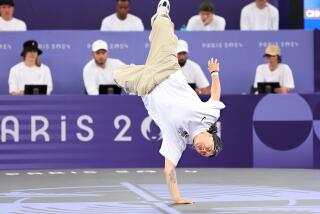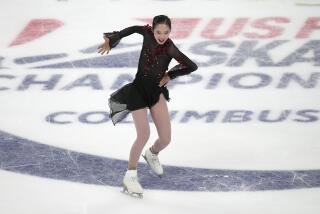At 16, Asada elevates with short program
- Share via
HARTFORD, CONN. — It was one of those reminders why this sport can be so extraordinary, when a skater fuses art and athleticism with consummate ease into a performance that transports an audience to a state of stunned admiration.
Skimming across the ice with feathery grace, floating through her powerful jumps, echoing in her movements the unadorned eloquence of the Chopin nocturne to which she was skating, Japan’s Mao Asada looked extraordinary to everyone but her coach.
“That,” Rafael Arutunian said, “was normal. That is the way she skates.”
This was, of course, only 2 minutes 45 seconds in Friday’s short program at Skate America, hardly enough to start thinking about Asada, 16, as one for the ages. But her performance at the Hartford Civic Center overwhelmed even the superb skating of her countrywoman, Miki Ando, who had a personal-best 66.74, and left reigning world champion Kimmie Meissner (58.82, after putting a hand down on a triple lutz) of the United States as an afterthought.
It mattered little that three of 10 judges apparently found slight imperfections in Asada’s first jump, a triple lutz. The rest saw excellence throughout as she landed a triple flip-triple loop combination and scored 68.84 points, third highest ever for a short program.
“This is the first time I have had slow music for a whole program,” Asada said. “I was concerned about it and happy I did that well.”
In the men’s competition, Japan’s Nobunari Oda won despite one of Evan Lysacek’s patented long-program comebacks.
“He’s a great long-program skater,” Coach Frank Carroll said of Lysacek, the American who won the long program but could not overcome 11-point deficit after the short program. “I think he gets mad. What I have to do is get him mad at the beginning of the competition instead of the end.”
*
Philip Hersh covers the Olympics for The Times and the Chicago Tribune.
More to Read
Go beyond the scoreboard
Get the latest on L.A.'s teams in the daily Sports Report newsletter.
You may occasionally receive promotional content from the Los Angeles Times.






